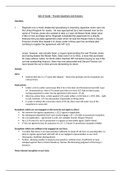Sale of Goods – Practice Questions and Answers:
Question:
1. Reginald runs a motor dealership specialising in importing Japanese motor cars into
the United Kingdom for resale. He was approached by a well dressed man by the
name of Thomas Jones who wanted to take a 2 year old Nissan Note (retail value
£10k) on hire purchase terms. Reginald completed the paperwork for a directly
financed hire purchase agreement under which he sold the Nissan Note to Secure
Finance Ltd who then leased it to Jones under a three-year hire purchase plan
(omitting to register the agreement with HPI Ltd).
Jones, however, was actually Sean, a rogue impersonating the real Thomas Jones,
and having leased the Nissan Note, Sean sold it on to Alice, a bona fide purchaser
for value without notice, for £9.5k (Alice checked HPI Ltd before buying so see if the
car had outstanding finance). Sean has now absconded and Secure Finance Ltd
have traced the car to Alice and are demanding its return.
Answer:
Intro:
Noticed that this is a 3rd party title dispute – Nemo Dat principle and its exceptions are
relevant here.
Main points:
Under s.21(1) a seller cannot pass title if he or she does not themselves have title. Case
of - Greenwood etc. Here S/TJ cannot pass title to A since S/TJ had no title to pass,
having purported to enter into hp agreement with owner, SF Ltd.
Alice has, prima facie, a claim against S/TJ under either s.12(1) SGA or s.17(1) CRA – right
to sell, however, S/TJ has absconded. (Impossible to bring claim).
In order to defeat the conversion claim of SF Ltd, Alice must fall under one of the
exceptions to nemo dat.
Exceptions which are not engaged on the facts (do not apply to Alice):
No common law agency agreement, s.21(1) agency inapplicable.
No subsequent disposition by R such would engage s.24 / s.8 seller in possession exception.
No s.23 application – agreement is void, not voidable (Cundy; Shogun Finance)
No s.2 FA since R is not in possession in capacity as mercantile agent (Staffs Motor)
JT has not agreed to buy for purposes of s.25 / s.9 buyer in possession exception (Helby).
Exceptions which are unlikely to be engaged on our facts:
It is likely that there is no representation sufficient to estop SF Ltd from re-asserting title: no
duty to register agreement with HPI Ltd so no negligent representation on our facts
(Moorgate; Chatfields distinguished).
Further, allowing another to possess your goods is, without more, insufficient to raise
estoppel against them (Central Newbury). Review the dissenting judgment of Denning LJ
however.
Most relevant exception on our facts:
, On our facts, the most relevant exception is s.27 HPA 1964, and you should explain and
apply the requirements of that provision – Supply of motor vehicles. Detail is important,
s.27(1); s.27(2); s.28; s.29. Be precise in your interrogation of the statutory provision.
It is the most relevant exception, since pre-Shogun Finance, it was assumed to protect A on
such facts.
However, post Shogun, Sean is not a debtor under a hire purchase agreement as required
under s.27(1). Therefore, A cannot rely on s.27(2).
This scenario is a good illustration of the limited ability of the exceptions to protect an
innocent third party purchaser: A must surrender possession of the vehicle and her only
claim is in contract against Sean, the rogue.
That is so even though there are multiple exceptions and only one needs to be engaged to
protect a third-party. This is sometimes by judicial decision making (e.g. Shogun; Central
Newbury) or legislative intent (e.g. the complex requirements of s.2 FA).
n The combined effect of both features is the tendency to protect the original owner
and the concept of property, but there are strong arguments to suggest this scenario
reflects the unbalanced nature of this area of law – should A not be protected since
(i) she can do nothing to protect herself from the situation and took all prudent
precautions and (ii) it would promote the certainty of commercial transactions.
n Consider how Devlin LJ in Ingram might suggest we resolve this problem question.
How might positive change be effected here? Adopt position of minority of HL in
Shogun perhaps or is more substantive reform necessary?
n Devlin LJ in Ingram – Ingram v Little – the original owners successfully got car back.
Devlin LJ- the loss should be divided between them in such proportion as is just in all
the circumstances. If it be pure misfortune, the loss should be borne equally; of the
fault or imprudence of either party has caused or contributed to the loss, it should
be borne by that party in the whole or in the greater part.’
Question:
2. Terence and Tracy run the Flowerpot Gardening Centre as a partnership. They decided that
the Flowerpot Gardening Centre would be more successful if they extended the range of plants and
related products they stocked. Accordingly they entered into a contract with Zen Products Ltd in
September 2020 to stock a selection of orchids; bonsai trees; garden furniture and garden hand-
rollers. The new products were commercially successful but resulted in numerous customer
complaints including:
(a) A selection of orchids, sold as a bargain lot to Andrew (a gardener by trade) for £100,
which all died within one week of purchase;
(b) A garden hand-roller, sold online to Benjamin for £150, who at 82 years old found it too
heavy for use;
(c) A solid oak outdoor table, sold to Cedric for £800, who discovered a three inch split in
one of the table legs; and
(d) A garden shed, sold to Daniel in kit form for £50, who wasted three hours one Sunday
afternoon attempting to assemble the shed, before realising that it was impossible to do
so using the instructions supplied.
Advise Terence and Tracy.
Intro:




